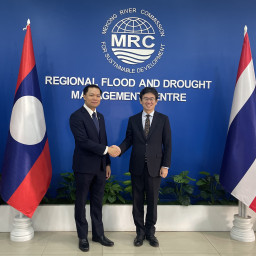MRC holds Special Session on Prior Consultation of Don Sahong Hydropower Project
Joint Committee agreed to report to the MRC Council for further guidance.
Vientiane, Lao PDR, 28 January 2015—The Mekong River Commission (MRC) held a Special Session of its Joint Committee on the Prior Consultation process for the proposed Don Sahong Hydropower Project. The Meeting included a presentation of the Technical Review Report by the MRC Secretariat and the outcome of the regional public consultation.
On 30 June 2014, Lao PDR notified the other MRC Member Countries, Cambodia, Thailand and Viet Nam, through the MRC Secretariat of its intent to have the project undergo the MRC’s prior consultation.
The six-month prior consultation officially started on 25 July 2014. Over the course of the process, the Member Countries have discussed and evaluated the risks and benefits of the project, which will produce 260 megawatts of electricity and will be located in one of the braided channels in the Mekong River’s Siphandone area in southern Laos.
During the six-month platforms for civil society to learn about the project and voice their concerns were held by the National Mekong Committees of Cambodia, Thailand and Viet Nam.
On 12 December 2014, the MRC Secretariat held a regional public consultation in Pakse, Lao PDR. The meeting provided an additional opportunity for civil society, non-governmental and governmental organisations, regional and international organisations to find out more about the project and to share their concerns. One day prior to the regional public consultation, participants joined a site visit and were able to talk to representatives from the developer, Mega First Corporation Berhad, as they explained some of the major features of the dam and the proposed measures to minimise and mitigate any potential negative impacts.
The majority of stakeholders expressed their concerns about the impact on fish migration and food security; the need for more in-depth studies into the fisheries of the Mekong and their behaviour as well as more information about the potential transboundary impacts of the project. They suggested that more time be allowed for the MRC to conduct further studies and assess the information.
The MRC’s technical review evaluated the project against the MRC Preliminary Design Guidance for Proposed Mainstream Dams in the Lower Mekong Basin (PDG), identified gaps in the project documents submitted by Lao PDR and provided recommendations.
Based on the said process and complying with the six-month deadline, each notified country submitted a “Form/Format for Reply to Prior Consultation”, a document that registers their official responses to the proposed project.
Cambodia supported the socio-economic development of Lao PDR but raised concerns about the potential negative impacts to Cambodia due to the project’s proximity. They recommended that transboundary environmental and socio-economic impacts assessments be conducted in the downstream areas, particularly areas adjacent to the project site, the Cambodian Mekong River and the Tonle Sap Lake, prior to the project’s implementation. “Due to the fact that many uncertainties and concerns remain unsolved, it is therefore additional time is required for the MRC Secretariat, International Expert Groups, the MRC member countries, and other relevant institutions to continue carrying out in-depth studies and detailed assessment on trans-boundary environment and socio-economic impacts…”, the reply form stated.
In its response, Thailand is fully aware of how the project plays an important role in the development path of Lao PDR. They expressed their public views and concerns that the data and information provided is insufficient to assess the potential transboundary impacts of the project in terms of the river’s flow regime, fisheries ecology, fish migration, tourism, and the livelihood of the Thai people, among others.
“Additional data and information are, thus, required for further consideration and assessment of both positive and negative impacts. It is highly recommended that transboundary impact assessments should be properly conducted and disseminated”, read Thailand’s official reply form, which concluded with the proposal to extend the timeframe of the prior consultation for an additional six months.
From their part, Viet Nam highlighted the Spirit of Cooperation and responsibility shown by Lao PDR in applying the relevant provisions of the 1995 Mekong Agreement and the Procedures for Notification, Prior Consultation and Agreement (PNPCA). They stated that the impacts caused by the Don Sahong Hydropower Project should be considered in conjunction with that of the whole cascade proposed on the Mekong mainstream to the downstream and that attention should be paid to transboundary effects on the Mekong Delta of Viet Nam.
“Outcomes of national consultations as well as additional studies carried out by Vietnamese experts all come to the same conclusion that there is still lacking a lot of necessary information; impacts on relevant areas (particularly trans-boundary impacts) are yet to be verified; mitigation measures proposed by the developer need to be persuasively proven; and the consultation timeframe (6 months) was short, not enough for comprehensive studies and consultations”, the reply form stated. Viet Nam requested to extend the prior consultation until the end of 2015 to address data and information gaps, add or improve mitigation measures and to expand the consultation activities in the region.
In its statement, Lao PDR expressed its gratitude to Cambodia, Thailand, Viet Nam and the MRC’s Development Partners for their understanding and support of their national hydropower development policy and their efforts to improve the living standards of the Lao people. They stressed that they had agreed in good faith to undergo the prior consultation process to assure the parties concerned that all viable options to develop a better project had been considered. Lao PDR added that the process has strengthened their conviction that the project will utilise the waters of the Mekong River “in a reasonable and equitable manner consistent with the terms and spirit of the 1995 Mekong Agreement.”
“As we have together addressed all legitimate concerns raised over more than a year of discussions and the Lao PDR has fulfilled all requirements of the 1995 Mekong Agreement, we are pleased to bring the Prior Consultation process on the Project to a close”, the statement read, adding that this does not mean that Lao PDR is closed to further efforts in good faith to improve the project and that they remain open to comments and suggestions from the Member Countries.
“Lao PDR will continue to exercise its sovereign right to develop its natural resources within its territory subject to the guiding principles of reasonable, transparency and good faith”, the statement concluded.
Based on the differing views of its members, the Joint Committee decided to refer the matter to the MRC Council, the highest MRC governance body which consists of water and environment ministers from the four Member Countries.
The Procedures for Notification, Prior Consultation and Agreement (PNPCA), established under the 1995 Mekong Agreement signed by the four countries, specify that the types of project that require the Prior Consultation include any water uses on the mainstream during the dry season which may have significant impact on the river flow regime and water quality.
This is the second time that the MRC undertakes such a process. In September 2010 and for the first time since its founding in 1995, the MRC carried out the prior consultation for the 1285-megawatts Xayaburi Hydropower Project located on the Mekong mainstream.
Note to editors:
The MRC is the inter-governmental organisation established to promote regional cooperation and facilitate dialogue on the sustainable management of the Mekong Basin among governments, the private sector and civil society. It is not a supra-national or regulatory body. The commission looks across all sectors including sustaining fisheries, identifying opportunities for agriculture, maintaining the freedom of navigation, flood management and preserving important ecosystems. Superimposed on these are the future effects of more extreme floods, prolonged drought and sea level rise associated with climate change.
The Prior Consultation is one of a number of protocols in the 1995 Mekong Agreement to promote cooperation in sustainable management of the basin's water resources and avoid regional disputes from developing. According to the Mekong Agreement, the prior consultation is not a right for any Member Country to veto the project, nor is it a right for a country proposing the project to go ahead with it without taking into account the others’ rights.
The Notification process is a prerequisite for the development of any water use project proposed for a tributary, which may have a significant impact on the mainstream, or for the Mekong mainstream during the wet season without inter-basin diversion. It requires a notification to the MRC and submission of relevant project information to enable the notified Member Countries to foresee the project’s water use and any significant impact that might stem from this.
The prior consultation is not a process to seek approval for the proposed project. It is a platform for the notified countries (Cambodia, Thailand and Viet Nam) to raise and discuss their concerns on potential effects the project may have on their territories. It is also an opportunity for Lao PDR, who proposed the project, to better understand those concerns and to consider measures to address them.
For more information on the PNPCA, the Don Sahong prior consultation and access to the project documents please go to: http://www.mrcmekong.org/news-and-events/consultations/pnpca-prior-consultations/don-sahong-hydropower-project/
-END-





